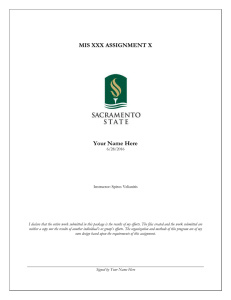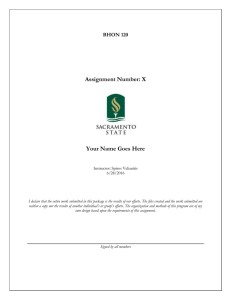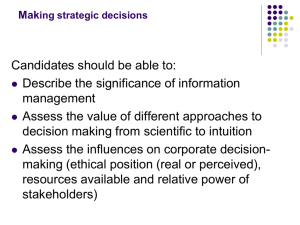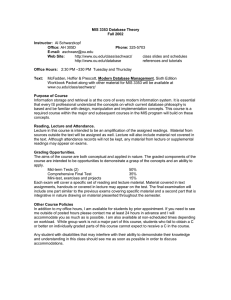Managing Technology and Systems General Information Instructor Information MIS 5402
advertisement
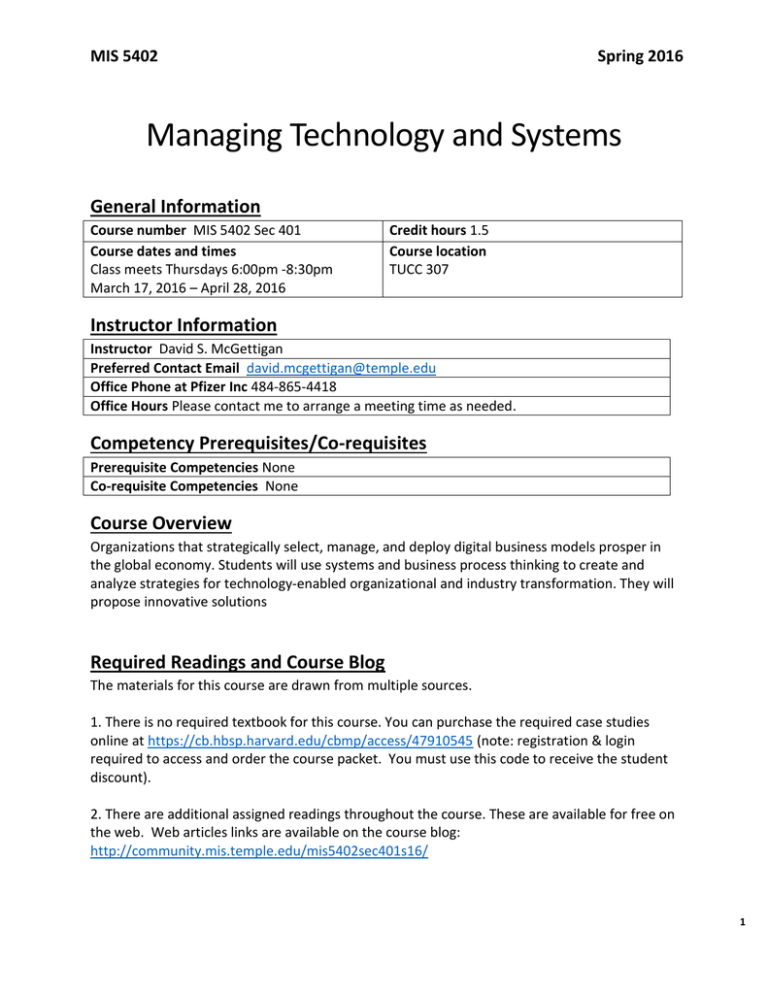
MIS 5402 Spring 2016 Managing Technology and Systems General Information Course number MIS 5402 Sec 401 Course dates and times Class meets Thursdays 6:00pm -8:30pm March 17, 2016 – April 28, 2016 Credit hours 1.5 Course location TUCC 307 Instructor Information Instructor David S. McGettigan Preferred Contact Email david.mcgettigan@temple.edu Office Phone at Pfizer Inc 484-865-4418 Office Hours Please contact me to arrange a meeting time as needed. Competency Prerequisites/Co-requisites Prerequisite Competencies None Co-requisite Competencies None Course Overview Organizations that strategically select, manage, and deploy digital business models prosper in the global economy. Students will use systems and business process thinking to create and analyze strategies for technology-enabled organizational and industry transformation. They will propose innovative solutions Required Readings and Course Blog The materials for this course are drawn from multiple sources. 1. There is no required textbook for this course. You can purchase the required case studies online at https://cb.hbsp.harvard.edu/cbmp/access/47910545 (note: registration & login required to access and order the course packet. You must use this code to receive the student discount). 2. There are additional assigned readings throughout the course. These are available for free on the web. Web articles links are available on the course blog: http://community.mis.temple.edu/mis5402sec401s16/ 1 MIS 5402 Spring 2016 Competency Map MBA Competency Course Learning Objective Key Skills Evaluation Method Influential Communication Use innovation frameworks to analyze competitive landscape for emerging IT products and services. Apply new digital business models such as cloud computing, web services, crowdsourcing, and twosided platforms to envision new products and services. Analyze disruptive potential of technology and formulate a response from an incumbent firm. Create a business case for the value of an information technology initiative. Analyze the transformative impact of technology on standard business practices. Identify the components of enterprise information architecture and its strategic role in the organization. Compare IT governance models in both a singlecountry and multinational context. Articulate the business case for IT in writing and presentations Case analysis Demonstrate ability to identify systems and processes in an IT implementation Learn IT Identify key issues in adaptation of governance models to local settings within a multi-national firm. Articulate guidelines for ethical use of corporate data. Participation Business Reasoning Identify and Evaluate Business Opportunities Implementation Management Cross-Cultural Effectiveness Ethical Management Explain the role of data, information, and knowledge in informing an organization’s strategy. Participation Reflection Journal Case Analysis Participation Case Analysis Reflection Journal 2 MIS 5402 Spring 2016 Grading Criteria A and A- The assignment consistently exceeds expectations. It demonstrates originality of thought and creativity throughout. Beyond completing all of the required elements, new concepts and ideas are detailed that transcend general discussions along similar topic areas. There are essentially none of the following: mechanical, grammatical or organizational issues that detract from the presented ideas. B-, B, B+ The assignment consistently meets expectations. It contains all the information prescribed for the assignment and demonstrates a command of the subject matter. There is sufficient detail to cover the subject completely but not too much as to be distracting. There may be some procedural issues, such as grammar or organizational challenges, but these do not significantly detract from the intended assignment goals. C-, C, C+ The assignment fails to consistently meet expectations. That is, the assignment is complete but contains problems that detract from the intended goals. These issues may be relating to content detail, be grammatical, or be a general lack of clarity. Other problems might include not fully following assignment directions. Below C- The assignment constantly fails to meet expectations. It is incomplete or in some other way consistently fails to demonstrate a firm grasp of the assigned material. Assignment Weight Participation and Class Preparation 25% Learn Information Technology Projects (2) 25% Case Study Analyses (2)* 25% Reflection Journal * 25% *The case study analyses and reflection journal will be prepared in a slide deck format. Preparation for Class Preparation before class – Each week you will submit a brief summary of those readings assigned for that class period (see the course schedule). This includes the cases. Submit a hard copy at the beginning of class and bring a copy for your reference during the discussion. Your weekly summary should include the following: 1. One key point you took from each assigned reading, including the cases (even if you submitted a case analysis that week): one sentence per reading. 2. One key point you learned from the readings as a whole: one sentence maximum. 3. One discussion question that you would ask your fellow classmates: one sentence maximum. Finally, keep in mind this assignment is graded pass/fail. If you do not fully complete the assignment, you will not receive credit for the write-up that week. 3 MIS 5402 Spring 2016 Participation This course applies a discussion-based method of instruction which relies heavily on your active participation and preparation both in-class and online. You are expected to read the case studies and readings and come prepared to engage the class in a meaningful conversation. You are encouraged to use your knowledge and experiences to build, test, and modify your own concepts through dialogues with the instructor and fellow students. Much of your learning will occur as you prepare for and participation in discussions about the course material. The course material has been carefully chosen to bring the real world into class discussion while also illustrating fundamental concepts. Each class will have time allocated for questions about the assigned readings and case study. Students called up to answer should be able to summarize the key issues, opportunities, and challenges in the case study. All students should be prepared to be answer these questions. If for some reason you feel unprepared to respond to a question, you may say “pass” and I will call on another student. Keep the total number of “passes” to a minimum over the course of the semester. Another important aspect of class participation is completion of in-class assignments and contribution to break-out group activities. To facilitate on-going learning of course material, we will also discuss course material on the class site. You should plan on commenting on the posts on the main class site. The site is public and provides you with a forum to demonstrate your insights and ideas to the rest of the world and to learn from others. Classroom Etiquette The classroom environment will be professional in a manner similar to one in a business environment. Additionally, the classroom environment will be one where you can express and expand your critical thinking. The environment that the professor, you and your fellow students create in class directly impacts the value that is gained from the course. To that end, the following are my expectation of your conduct in this class: 1. Arrive on time and stay until the end of class. 2. Turn off cell phones, pagers and alarms while in class. 3. Limit the use of electronic devices (e.g., laptop, tablet computer) to class‐related usage such as taking notes. Restrict the use of an Internet connection (e.g., checking email, Internet browsing, sending instant messages) to before class, during class breaks, or after class. 4. During class time speak to the entire class (or breakout group) and let each person “take their turn.” 5. Be fully present and remain present for the entirety of each class meeting. 4 MIS 5402 Spring 2016 Tentative Course Schedule Wk Major Topics Read in Advance Due by Start of Class (note: links may need to be copied into your browser) #1 03/17 Course Introduction Thomas Friedman: “The World is Flat 3.0” (48 minutes) http://video.mit.edu/watch/the-world-is-flat-30-9321/ N/A #2 03/24 No Class Aaronson, D. (1998). Overview of Systems Thinking. http://www.thinking.net/Systems_Thinking/OverviewSTarticle.pdf Learn IT #1 (submit electronically) #3 03/31 Systems Thinking Crowdsourcing, Online Reviews Crowdsourcing: Your Key To A More Effective, Engaged Organization? http://www.forbes.com/sites/chriscancialosi/2015/08/03/crowds ourcing-your-key-to-a-more-effective-engaged-organization/ Weekly Reading Summary Contemporary Case: Uber #4 04/07 Disruptive Innovation Two-Sided Platforms Disruptive technology: Dead companies do tell tales http://www.cio.com/article/2850122/innovation/disruptivetechnology-dead-companies-do-tell-tales.html Weekly Reading Summary Case #1 ABB Delivers Disruptive Innovation Out At Sea http://www.forbes.com/sites/jonathansalembaskin/2015/07/15/a bb-delivers-disruptive-innovation-out-at-sea/ Historical Case: Kodak #5 04/14 Digital Innovation Activity: OpenSourcing Google Apple or Startups: Who will lead the Automotive … http://www.forbes.com/sites/bijankhosravi/2015/10/03/googleapple-or-startups-who-will-lead-the-automotive-renaissance/ Weekly Reading Summary Learn IT #2 Free! Why $0.00 Is the Future of Business http://www.wired.com/techbiz/it/magazine/1603/ff_free?currentPage=all Contemporary Case: Apple in 2015 #6 04/21 Knowledge Management and Bus. Intelligence Knowledge Management Definition and Solutions http://www.cio.com/article/2439279/enterprisesoftware/knowledge-management-definition-and-solutions.html Weekly Reading Summary Case #2 Contemporary Case: Open Innovation at Siemens 5 MIS 5402 #7 04/28 Global Management and Platform Strategies Spring 2016 Contemporary Case: Google and Android Historical Case: Volkswagen Weekly Reading Summary Reflection Journal (Due 10pm on 04/28) Learn IT Information technology is pervasive in our personal and professional lives. Each of you certainly has had experience with multiple types of Information Technology and, equally, you are also each likely to have areas of opportunity to enhance your Information Technology knowledge. The goal of these assignments is to help you expand your areas of knowledge. Learn IT Assignment #1: Learn IT Assignment #2: An hour of Code Lynda.com software training Case Study Analyses In addition to preparing to discuss each of the assigned weekly case studies, you will work in groups to prepare an in‐depth analysis of 2 case studies during the semester. To complete a case analysis: 1. Questions will be posted to the class site. Select which question or questions your will answer. Make it very clear which questions you are answering. 2. Analyze the case in depth to answer the question(s). Conduct additional research to support your analysis. Your work must by evidence based. Cite your sources. 3. Document your analysis as a slide deck (10 slides maximum). The first slide must include names of all team members and the case name in the top‐left corner. 4. Submit a hard copy of the assignment by the start of class on the due date. Since we are discussing the material in class, cases must be completed on time in order to receive credit. Late submissions will receive a failing grade. Academic Honesty Source: Temple University Graduate Bulletin. Available online at: http://www.temple.edu/grad/policies/index.htm 6 MIS 5402 Spring 2016 Academic honesty and integrity constitute the root of the educational process at Temple University. Intellectual growth relies on the development of independent thought and respect for the thoughts of others. To foster this independence and respect, plagiarism and academic cheating are prohibited Plagiarism is the unacknowledged use of another individual's ideas, words, labor, or assistance. All coursework submitted by a student, including papers, examinations, laboratory reports, and oral presentations, is expected to be the individual effort of the student presenting the work. When it is not, that assistance must be reported to the instructor. If the work involves the consultation of other resources such as journals, books, or other media, those resources must be cited in the appropriate style. All other borrowed material, such as suggestions for organization, ideas, or actual language, must also be cited. Failure to cite any borrowed material, including information from the internet, constitutes plagiarism. Academic cheating results when the general rules of academic work or the specific rules of individual courses are broken. It includes falsifying data; submitting, without the instructor's approval, work in one course that was done for another; helping others to plagiarize or cheat from one's own or another's work; or undertaking the work of another person. The penalty for academic dishonesty can vary from a reprimand and receiving a failing grade for a particular assignment, to a failing grade in the course, to suspension or expulsion from the University. The penalty varies with the nature of the offense. Students who believe that they have been unfairly accused may appeal through their school/college's academic grievance procedure and, ultimately, to the Graduate Board if academic dismissal has occurred. Academic dishonesty will not be tolerated in this class. In cases of cheating, both parties will be held equally responsible, i.e. both the student who shares the work and the student who copies the work. Penalties for such actions are given at instructor discretion, and can range from a failing grade for the individual assignment, to a failing grade for the entire course. Acknowledgements Professor James Moustafellos (syllabus) MIS Faculty of the Fox School of Business (lecture content as noted each class) 7

